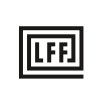“To Kill This Love” is not a film to be found in the handbook of a novice cinemagoer. ‘I am grateful to Agnieszka Wolny-Hamkało for choosing it to be presented with the original audio description,’ writes Natasza Kornacka of the LFF Media Group after Saturday’s screening of the old Polish film recalled by the contemporary poet.
Audio description is a verbal, spoken description of an image, for example of a film, intended for people with visual impairments. But not only for them. During LFF, the old Polish film “To Kill This Love” was presented as part of an innovative project – with the addition of a creative audio description. The narrator was poet Agnieszka Wolny-Hamkało and she performed phenomenally. She was not afraid to add her own hilarious remarks, which often made the audience laugh, but she also knew when it was appropriate to give the film its own space. Using colloquial speech, borrowings and irony, Wolny-Hamkało gave the impression of watching a film with a friend whispering comments into your ear.
The narrator’s reasoning for choosing this film is that no one remembers it any more and the filmmakers (Janusz Morgenstern, Janusz Głowacki) are no longer alive to remind us of it.
Personally, I am very grateful for this. “To Kill This Love” is not a film you will find in the handbook of the novice cinemagoer. Both Morgenstern and Głowacki had far more famous titles in their portfolios, which is why the whole experience was even more special to me.
In the film, the filmmakers take us back to Poland of the early 1970s, the Decade of Gierek, where the propaganda of success was just developing and the consumerism myth supported the creation of unrealistic dreams. It is not without reason that the first conversation between the characters is about money, or more precisely about a flat, a car and a dog that money can buy.
We meet Magda and Andrzej when they are most hopeful for the future, they are young, dreaming, and nothing can go wrong. Perhaps Głowacki predicted the future failure of Edward Gierek when he wrote the script, because the characters fall victim to it in an almost caricatural way.
It is hard not to find the similarity between our reality and this communistic one, because although the political system is different, the people turn out to be the same. We still succeed and fail, we dream, get hurt and hurt others.
This is what happens to Magda and Andrzej. She fails to get into medical school and starts working as a nurse to pass her exams next year, he is not accepted to university and is looking for a job. They start this journey together, staying optimistic, but their paths diverge over time.
Magda is resourceful and charming in her childishness. Working at the hospital is traumatic, but she doesn’t lose her spark and forges ahead. Andrzej cannot get to grips with all this adulthood and eventually resorts to an affair to secure his position.
At the same time, the scenes with the unrelated characters – the construction site caretaker and his dog – illustrate Magda and Andrzej’s relationship in a brilliant way. At the outset, love is unconditional, but when money is involved, it turns out to be something unwanted, a hindrance on the way to success. By killing this love, we kill ourselves.
In one scene in the background, we see a broadcast of the Apollo 15 launch, the fourth time NASA astronauts set foot on the moon, but none of the characters in the film cares. This is very meaningful. After all, what is the significance of space travel compared to everyday life? What is success if we have no one to share it with?
Saturday’s screening of “To Kill This Love” was organised thanks to LFF’s collaboration with the Korelacje Festival in Wrocław, which presents Polish films with the addition of creative audio descriptions.
Natasza Kornacka
On Saturday, 30 November at 17.30 as part of LFF there will be a screening of the 1982 film “The Wolf”. The film with Polish narration (the original audio description read by Dorota Masłowska) and subtitles for the Deaf or Hard-of-Hearing (SDH). The screening is free of charge, but you must show your ticket when entering the room. Tickets are available at the box office of the Centre for Culture in Lublin.
